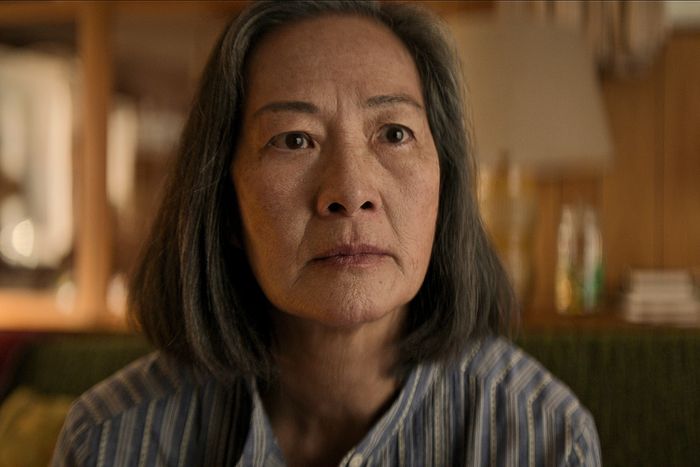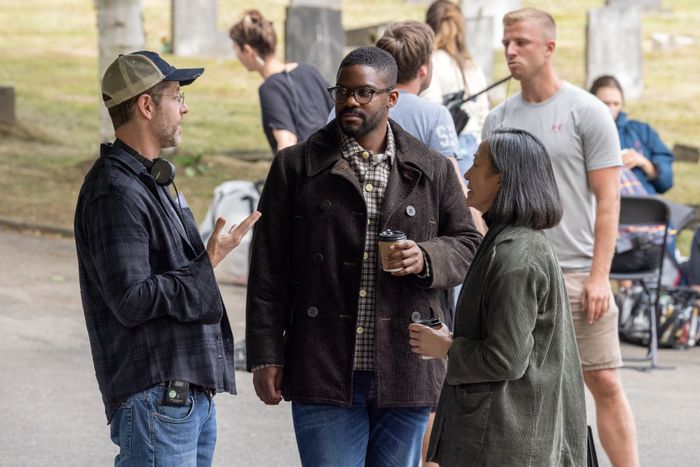
Spoilers follow for all eight episodes of 3 Body Problem on Netflix.
Rosalind Chao came to her first day of work on 3 Body Problem prepared to die. A little too prepared, perhaps.
“We were shooting on a cliff in Spain,” Chao recalls, referring to the final scene for her character, political prisoner turned pro-alien cult leader Dr. Ye Wenjie. Faced with the culmination of her life’s work — public acknowledgment of the San-Ti — and the destruction of most of her acolytes at the hands of the British government, Ye returns to the site of her first contact with the alien race to jump to her death. There she encounters Tatiana (Marlo Kelly), who is also working on behalf of their alien overlords, and instead surrenders to assassination. “We get up there and it’s a cloudy day,” says Chao. “We’re at the end of the cliff, mind you, and it’s windy. It’s a really scary drop — there’s no other way to put it. They have a stunt guy standing there at the bottom of the cliff, and he’s telling me, ‘Don’t walk any closer.’
“I know this sounds crazy, but he kept having to tell me to stop,” she continues. “He’d put his hand up: ‘Too far!’ Thinking back on it, I kept inching Marlo closer to the edge. The weather was not with us, and the wind almost knocked us over. Both of our eyes were so big because we came so close to …” She stops mid-sentence. “Yeah.”
Chao credits her time on 3 Body Problem with making her a braver actress in more ways than just playing chicken with a Spanish cliffside. Created by The Terror: Infamy’s Alexander Woo and Game of Thrones’s David Benioff and D.B. Weiss — whom Chao refers to as “the boys” — the Netflix adaptation of Cixin Liu’s novel combines heady sci-fi ideas, spectacularly creepy visuals, and a welcome emphasis on what we owe one another as people. It’s also the first time Chao has watched her own work in decades.
There’s so much going on in this show that it’s hard to know where to begin. When you first read the script, what was the main thing that jumped out at you?
Don’t judge me — I was struck by how you could have empathy for any of the characters. I’m kind of judgy, and it’s something I work on. With this script, I could understand where each character came from; any of us might behave the same way. And given the way the world is right now, that sort of empathy is so important.
The need for empathy’s an interesting point. As I watched the show, I’d think of the anti-alien characters as the good guys and the pro-alien characters as the bad guys. But the pro-alien characters aren’t necessarily evil at all.
Yes, exactly. I’ve been around people who are, for lack of a better word, enthusiasts. When you understand their background, you can understand why they were drawn to a cult mentality like Ye was.
I don’t know what it was about me, but when I was young, I used to get approached by cults. I remember walking through a mall when I was still in my teens and a person approached me and handed me a pamphlet. I remember thinking, Wow, if I didn’t have a family or friends, or if I felt isolated, I could see how this would be attractive. They seem so nice and warm and loving. One would be drawn to that if you feel that everything has fallen apart for you.
God, this is the first time I’ve thought of that. I guess people thought I seemed vulnerable to that.
Were you?
No. I mean, I had a really close family. I think I appeared to be very naïve, and I used to spend a lot of time alone. I was very shy, a solitary person, and I think that emanated from me. Look at me blaming myself.
Ye is fascinating because cults teach everyone they’re special, but she really is special. She’s the person with the scientific know-how to contact aliens in the first place.
I’ve been around a lot of people who were labeled prodigies at a young age. My daughter’s a musician, and a lot of her teachers were like that. There’s a sense of themselves, a confidence in their decision-making and moving forward in their field. They don’t question themselves like those of us who aren’t prodigies.
The show is predicated on the question of how — or if — people come together during times of crisis. From climate change to COVID, there’s ample evidence in the real world to suggest that maybe we don’t.
I wish we could watch this and say, “How could that happen?” But in reality, we can see how. Can we come together? That’s the question. I’m an optimist, and I like to believe that when push comes to shove, we can. I do love that the show depicts the opportunity to come together to save humanity. But it’s challenging to see, isn’t it?
Ye does not give up, and that’s what I love about her. Even after she realizes she’s been betrayed, she leaves Saul with a nugget. What he does with it, we’ll find out.
I’m realizing now that Ye and Saul are parallel characters. Both are chosen for all-important missions for reasons beyond their immediate comprehension.
He’s a prodigy of sorts, and he gets passed the mantle.
But she does have this break where she’s confronted with the fact that the San-Ti view humanity as vermin. You can see something in her snap.
As you can see, you can read everything on my face, whether you want to or not. To me, it was challenging because Ye has such a big thick mask on all the way through. I never thought about it — I just tried to keep that mask on.
So what was it like for you to play someone who’s such an inveterate liar?
Did she lie, though? Was she lying?
Well, to suppress the part trying to hasten the alien conquest. To lie by omission, let’s say.
Right. There you go. She’s more of a shape-shifter. A lot of people, to survive whatever countries they’re in, have to become that to ensure their safety and the safety of their families. It’s not that she doesn’t care about Saul or Jin or her daughter. She doesn’t think of it as a lie; she thinks of it as an adjustment. To save the world.
It reminded me of the maladaptive behaviors people will adopt to survive abusive households.
Exactly. I’ve noticed that friends who’ve been raised in that sort of environment have a really good mask. The way they disguise their hurt … you can almost spot when somebody’s been raised with that sort of trauma. And Ye is definitely the result of generational trauma, so it’s in her bones. I don’t think she thinks, I’m going to lie. She’s just practical. She knows how to get what she needs.
It sounds like the main struggle for you as an actor was not giving more than this character was willing to give or capable of giving.
Derek Tsang, who directed episode one, had to keep saying, “Don’t show so much. Show less. What are you thinking about right now, Roz?” “I’m thinking about lunch.” “Okay, good.” [Laughs.] Instead of not giving, it was trying to turn off my transparency. Usually, as an actor, transparency is a benefit. This was a good exercise for me to learn how to shut that down. Let’s put it in a more positive way: to put up the shield.
This is the first time I’ve actually sat down and watched something I’ve been in, and it was jarring to me that Ye’s so different from Roz. I mean, not just the aging, the gray hair and all that, but the core of how she reacts to various situations is very different.
Why don’t you watch yourself?
I enjoy acting in the process so much that I don’t want to be robbed of that or disappointed. It was hard for me because I think it might be the first time I’ve actually seen something I’m in from beginning to end, except for when I was very young.
Why was this show the one?
Because Ye was so different physically than I am, it was easier to watch. It would take an hour and a half to put my makeup on and 45 minutes to take it off. They painted my hair gray, and it would adjust to the lighting — I mean, the detail in this was amazing. She really felt like a different person. Sometimes I’d come on set afterward without my makeup and it would take a minute before people realized it was me.
Also, I felt confident in — I call them “the boys,” but they’re grown men. Dan and David were there all the time, on set, at the monitor. I really trust them, so I didn’t feel nervous. And I didn’t want to miss out, because I missed out on watching Game of Thrones.
I was gonna ask.
In my defense, it came out when I had young children, so I couldn’t really have that on the TV. Once I was going to work with them, everybody told me, “Oh my God,” especially my son. My kids love Game of Thrones. My son was like, “Maybe you should watch that beforehand.” But I had met them, and I knew it was going to be a unique experience. They’re so smart, and they’re very empathetic to actors.
But now I can’t decide if I should watch Game of Thrones, because I saw 3 Body Problem and I was like, Oh my God. Will I be intimidated by them now? I will be intimidated by them. I really tease poor David, probably more than anybody — will I not feel comfortable anymore? [Laughs.] But that was the gist of the whole shoot. They moved my first day because it was my daughter’s graduation. When I thanked David, he said, “Well, I wouldn’t want to miss my daughter’s graduation.” And director Jeremy Podeswa was so calm on that cliff. They have this great producer Bernie Caulfield, and I always think back on her saying, “Yes, we can do it.” They made me feel like it was all possible. It takes away all your fear. And they kept us safe.
Yeah, you didn’t fall off the cliff. That’s one for them.
Despite my stupidity! But I had no fear with them. I have not had that experience before. They’ve given me a new horizon, workwise. They’ve made me braver.
This interview has been edited and condensed.
More From ‘3 Body Problem’
- The Best TV Valleys of 2024
- 3 Body Problem Is Not Afraid to Be TV
- 3 Body Problem? More Like Two More Seasons


